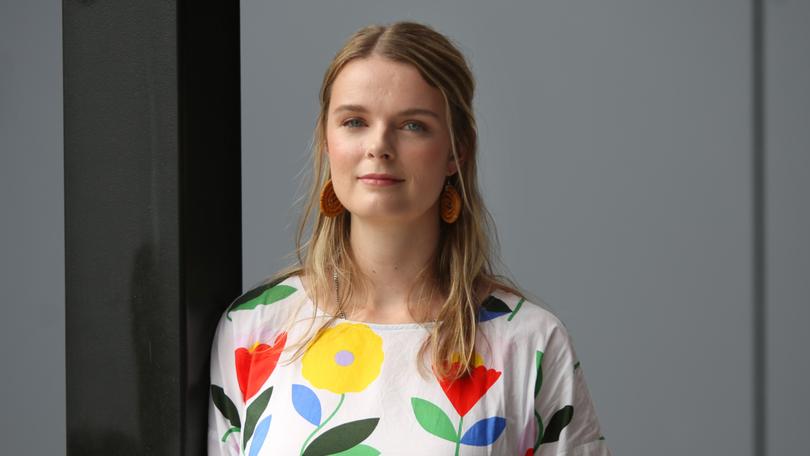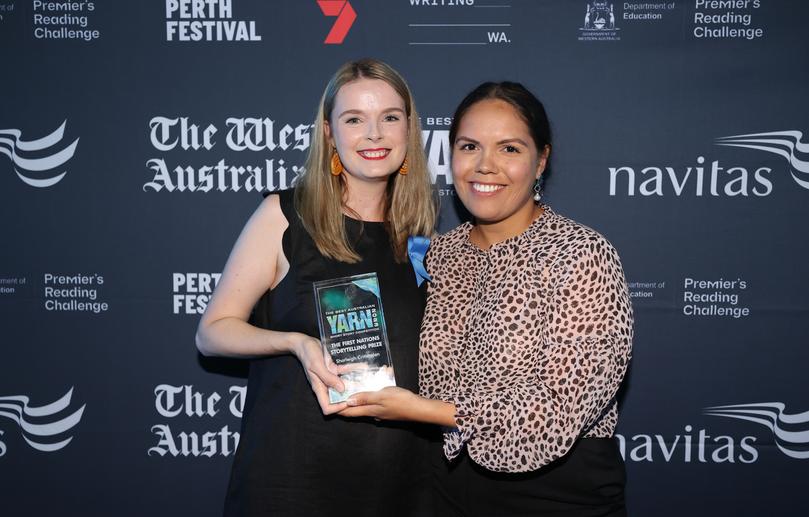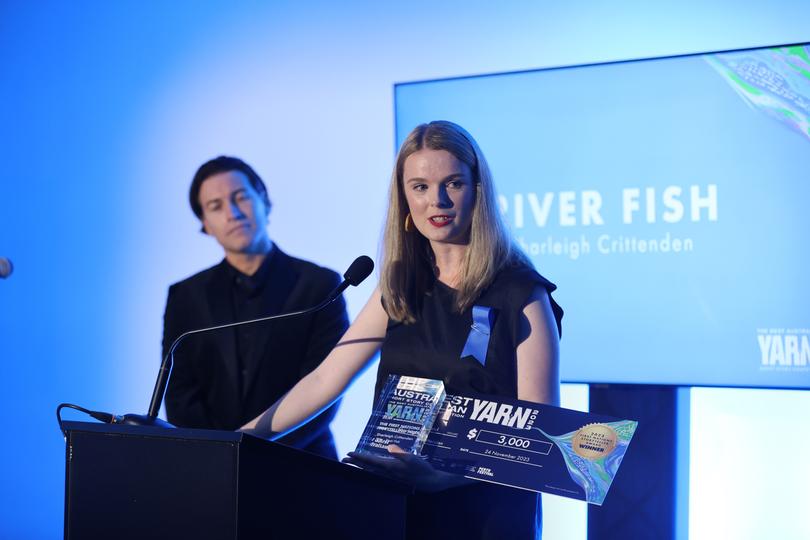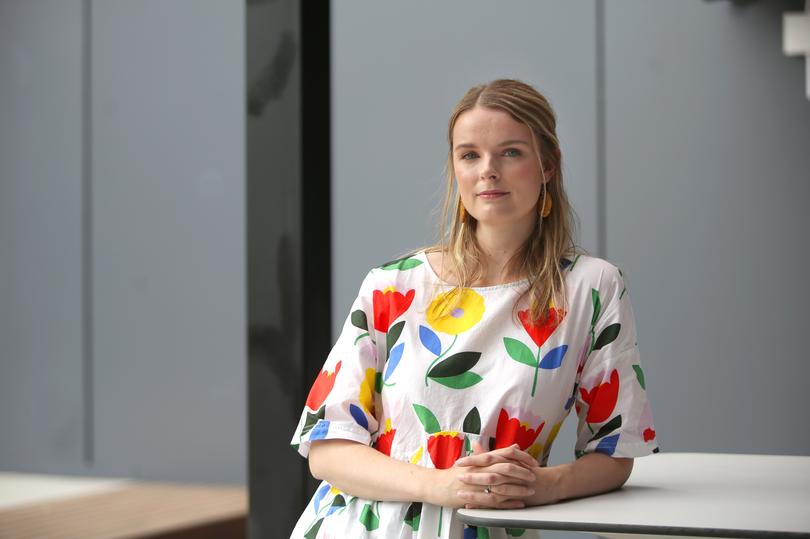First Nations winner Sharleigh Crittenden reveals how The Best Australian Yarn has changed her life
There was a time when Sharleigh Crittenden lacked confidence in her writing abilities. Now, she’s penning a novel.

She may be an award-winning writer, but there was a time when Sharleigh Crittenden lacked confidence in her writing abilities.
Crittenden, a Wiradjuri woman, was the winner of the inaugural First Nations prize in the 2023 Best Australian Yarn competition. She now has a novel in the works and is poised to graduate with a Bachelor of Arts and Law from the University of NSW, as well as being a wife and a mother.
While she once considered giving up writing altogether, she says it was her BAY success that helped spark a newfound love and passion for a career in storytelling.
Sign up to The Nightly's newsletters.
Get the first look at the digital newspaper, curated daily stories and breaking headlines delivered to your inbox.
By continuing you agree to our Terms and Privacy Policy.Last year her work River Fish won over the BAY judges to earn the competition’s first First Nations award.
Presented by The West Australian, BAY is the world’s richest prize for short stories and Crittenden’s tale was praised for its quintessentially Australian design and for touching on important social issues inspired by her own experiences.

Crittenden says while it was “incredibly surreal” to find out she had been selected from more than 5000 entries to make the BAY longlist, learning she was also in consideration for the First Nations category was almost more exciting.
“Because, you know, my story covers some important themes for First Nations Australians, so ... to think about my story, I guess in that context, yeah, it just was exciting,” she recalls.
“I was really drawn to the First Nations Prize, because I feel like there’s that aspect of, I guess, it’s cultural safety. I felt safer. I think, you know, for a lot of mob, like putting our stories out there, you know, is a really scary thing. And, yeah, it’s important to have cultural safety.”
This year, the winner of the BAY First Nations Prize will receive $3000 and will also be eligible to win the overall prize of $50,000.
For Crittenden, her love of storytelling comes from yarns around the kitchen table with her nanna. “We sit around the table and we yarn over a cuppa,” she says. “And so I guess storytelling, you know, we told stories about the past. And so the storytelling became, to me, just such an important way of viewing ... the world we live in and trying to make sense of it.”
After her BAY win, Crittenden is set to turn her entry into a novel with the support of a creative grant from publisher Magabala Books which was specifically created to support her project.
“I felt that there was more in the themes of (River Fish) around, I guess, the care and protection system and ideas of, kind of, cultural dispossession of, you know, generations of young people who are going through the care system in our communities,” she says. “I felt like those themes, I wasn’t quite done exploring them.
“So I started to think about this idea of ... what might happen to the protagonist in River Fish, you know, say in 15 years time, maybe she has her own children. And so I started to build this idea for (a) novel just after finishing River Fish and ... submitting it.”
The next 12 months will see Crittenden work on the first draft of the manuscript of her novel The Children Nobody Wanted, a first-person retrospective narrative that experiments with psychological realism.
“If you’d said to me, you know, 12 months ago that I’d be writing a novel, I’d probably say you were crazy,” she says.
Growing up in care and recognising that many Aboriginal children face this same experience, Crittenden says she wants to share stories that matter for a wider audience.
“I grew up kind of all over the place,” she says. “I grew up in the care system. So that’s, I guess, the major motivator for me, in a lot of my writing, is to bring that lived experience to audiences, but also I’m trying to kind of understand parts of my own experience when I write.
“And so I guess it’s one of the reasons why, you know, winning the First Nations Prize was so exciting because I wrote a story that mattered to me, I wrote a story that resonated with me, that kind of looked at aspects of my experience.
“The statistics are so terrible. And I think for me as a mother now ... this part of my novel is about looking back at the past and trying to understand that from a different perspective, that experience.”

Her achievements have not come without setbacks, and Crittenden says she considered giving up writing due to pushback and rejections.
“I actually almost stopped writing in about 2017 when I submitted a story to a journal and got rejected and I now understand that it’s pretty common, but it almost kind of made me give up on writing,” she says.
“And so, you know, I submitted to the Best Australian Yarn, I don’t know, I guess I wasn’t quite done yet. I hadn’t quite given up the fight.
“I’m definitely seeing writing as a potentially viable future for myself, which is, you know, that’s come completely by surprise.
“I just see that there’s a big gap between . . . First Nations views and the broader Australian community. I think stories have a big role to play in bridging that gap.
“It’s an experiential gap. I mean, a lot of non-Indigenous Australians would struggle to understand what it’s like growing up in the care system, and we’re so over-represented in that space ... and literature has a tremendous capacity for fostering empathy. You know, when we read stories, we read other people’s perspectives, we step into their shoes. And literature is a place where people are much more willing to do that.
“I think that’s the thing that’s most exciting for me about writing. As a First Nations writer we can invite people to come on a journey with us. We can invite them to walk in our shoes.”

When asked about the legacy she wants to leave behind, Crittenden’s answer is simple: she wants a better world for her children and all children.
“I feel pretty strongly that my children are ... my legacy. And I want them to grow up to be compassionate and empathic people. I want them to see the nuance in the world, I want them to see, you know, the beauty but also to stand up for injustice, to do so with kindness and courage. I’d love our kids, not just my kids, but our kids to grow up in a world where they feel that they can take, I guess, ownership of their own stories, their life stories ... their life, they can decide I’m going to do this and I’m going to do that. I’d like to see that, kids not being held back.
“One of the hard things I think for a lot of children and not just First Nations children, but children who are in difficult circumstances, that their voices aren’t heard a lot of the time and they, you know, it’s a really big thing to say young person, you know, your voice matters and what happens to you matters.”
Entries to The Best Australian Yarn are open until August 12.
This year, the winner of the First Nations Prize will receive $3000 and is also eligible to win the overall Best Australian Yarn Prize of $50,000. For details, go to bestaustralianyarn.com.au. If you would like to learn more about the First Nations Prize, register for the free In Conversation with Sharleigh Crittenden event hosted by Garlett Group
Originally published on The West Australian
